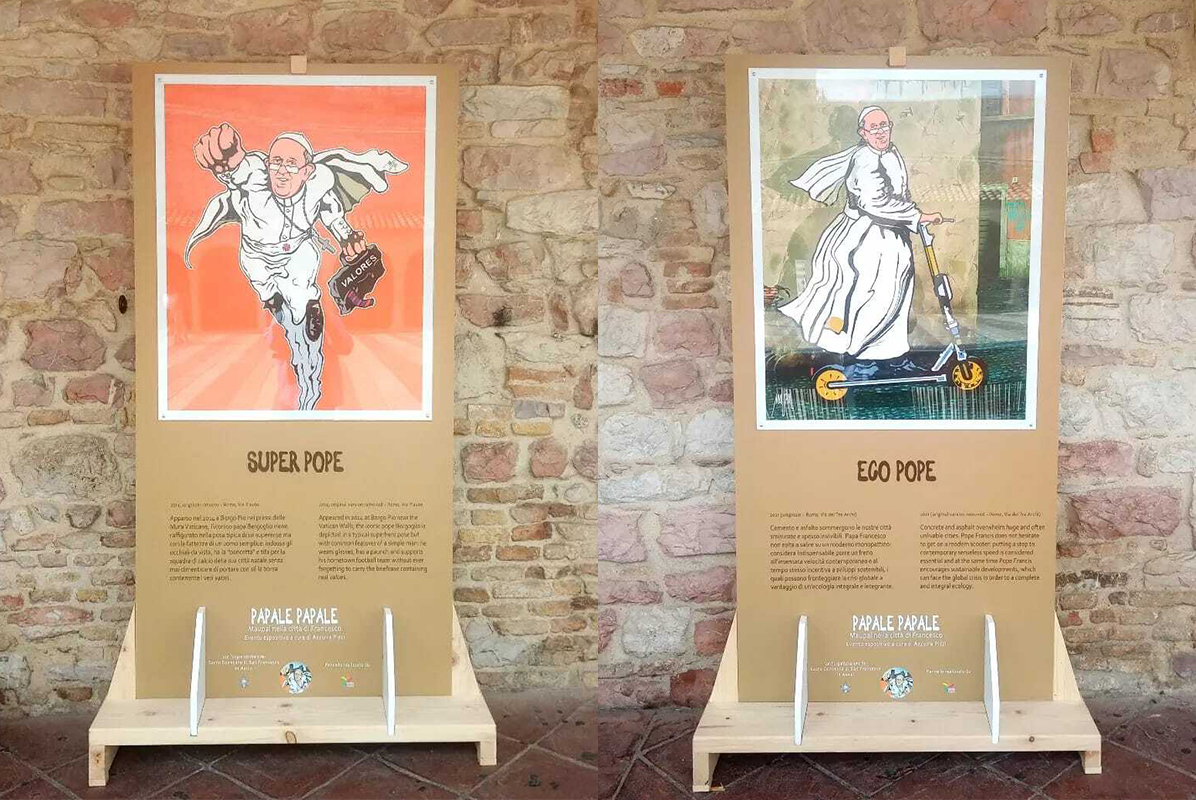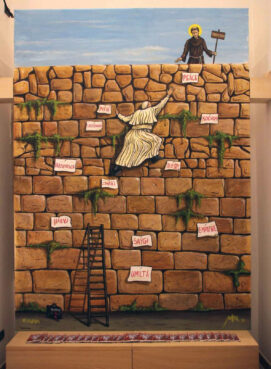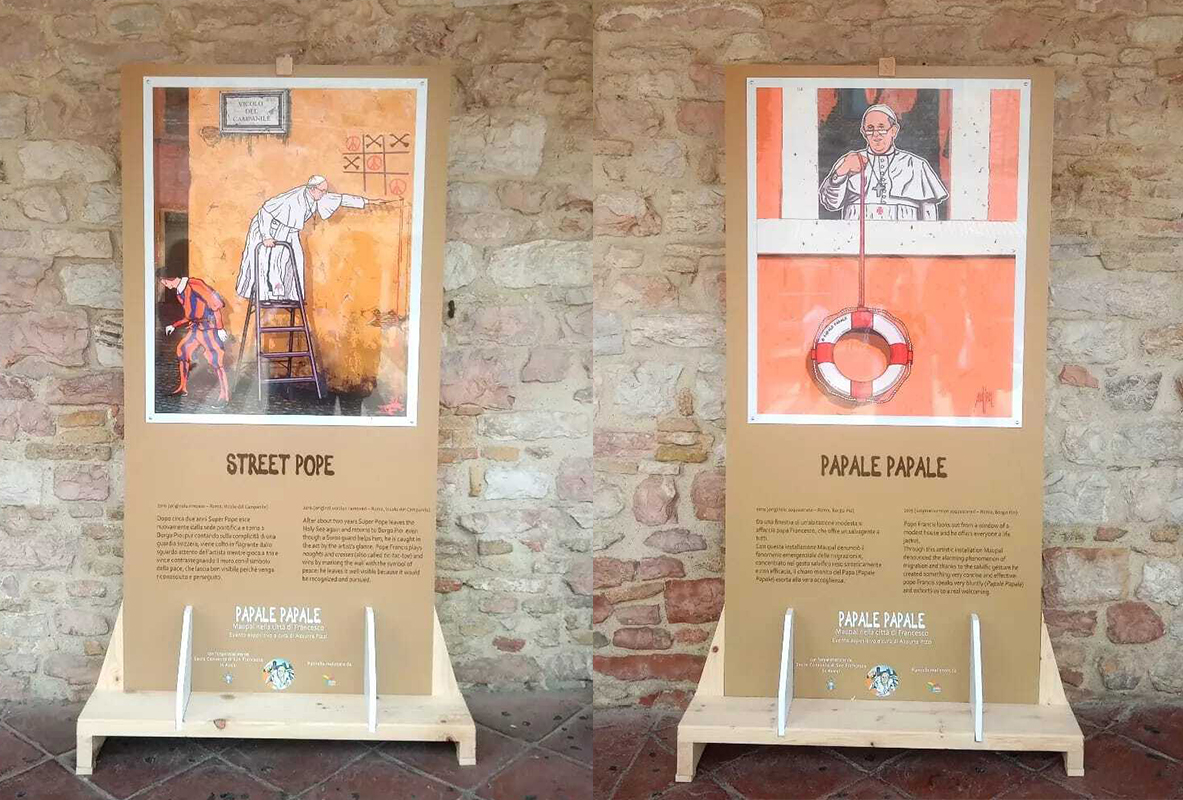
Images of Pope Francis by Roman artist Mauro Pallotta, or Maupal, on display in Assisi, Italy. Photos by Enrico Mattioni
VATICAN CITY (RNS) — Pope Francis’ economic vision meets graffiti art in a new show by Roman artist Mauro Pallotta, or Maupal, who hopes his work will inspire the thousands of young adults gathering in Assisi this week as they imagine a new kind of global economy.
The artist’s nine most influential works are on exhibit in the Basilica of St. Francis of Assisi until Nov. 6, along with a never-before-seen painting. The exhibition is called “Papale Papale,” a play on the Italian words meaning “papal” and “to state things very clearly.”
Pallotta’s graffiti art aims to bring the complexity of Catholic teaching to regular people on the streets.
“I try to represent in a graphic way the magisterium of Pope Francis by using designs that are understandable to adolescents,” said Pallotta in an interview with Religion News Service. “I use a simple and clear message to illustrate the main steps and objectives of Pope Francis.”
Pallotta’s art is on display in the small town as more than 1,000 young adults from all over the world descend on Assisi, the birthplace of Pope Francis’ namesake saint known for his dedication to the poor, peace and creation, for The Economy of Francesco meeting from Thursday through Saturday (Sept. 22-24). The gathering, which aims to promote a more inclusive, sustainable and equality-based economy, will convene “young economic scholars, entrepreneurs, and changemakers, from more than 100 countries,” according to the event’s website.

Roman artist Mauro Pallotta, or Maupal, depicts Pope Francis scaling a wall toward St. Francis of Assisi, on display in Assisi, Italy. Photo by Enrico Mattioni
After two days of workshops, roundtable discussions and networking, attendees will have a chance to hear from Pope Francis, who will be attending the event and delivering a speech on Saturday, followed by a reading and signing of The Economy of Francesco pact, which includes a series of personal commitments “and an appeal to citizens, institutions, and companies all over the world,” according to the EOF site.
The thought of young people working with an 85-year-old pontiff to challenge deeply rooted economic models may seem laughable to some, but Pallotta said he hopes his artwork will remind participants that it’s often the smallest and most humble who can change the world.
“It’s especially the simple people who do the greatest and most complicated things,” he said.
His first portrait of Pope Francis, “Super Pope,” launched the artist to international stardom in 2014 and remains his favorite to this day. “Even if that image shows a superhero,” he said, referring to the image depicting the pope soaring through the air with his white mantle, “he is actually a very humble and simple superhero.”
“He’s wearing glasses, has a bit of a belly, and his briefcase containing the Christian values that he always brings with him actually has a scarf emerging of his favorite soccer team in Buenos Aires,” he said.
Pallotta was born and raised in and around the Vatican and when Francis was elected in 2013, Pallotta said he immediately resonated with the new pope, who became something of a muse for him. “The greatest inspiration was his tremendous physical similarity with my grandfather who raised me,” he said.
Since then, Pallotta has made numerous representations of the Argentine pontiff, be it Francis playing golf and scoring for peace in “Pope’s Golf” or holding a lifebuoy doughnut from the papal window in “Papale Papale.”
“I like showing him performing daily tasks like cleaning, riding a scooter or throwing hearts with a sling because these are things that are part of the everyday life of children,” the artist said. Francis’ ability to seem relatable to people is what makes the pontiff “irresistibly pop” for Pallotta.

Images of Pope Francis by Roman artist Mauro Pallotta, or Maupal, on display in Assisi, Italy. Photos by Enrico Mattioni
In the Treasure Museum of the Basilica of St. Francis in Assisi, the artist showed his latest interpretation of the pope. Scaling a wall reminiscent of the Western Wall in Jerusalem, Francis is depicted as reaching for peace, while St. Francis of Assisi looks down at him and holds a sign reading “mercy” in Ukrainian. As the war in Ukraine ensues, Pallotta believes this graffiti depicts the “incredibly arduous journey toward achieving peace.”
RELATED: Is Pope Francis’ diplomacy of dialogue failing?
Though Francis has been an endless source of inspiration for the artist, Pallotta resists the idea of describing the pontiff as his patron. The first time he met the pope, it was after his general audience at the Vatican in 2014, where he offered the pope a copy of “Super Pope” painted on wood. They met a second time in 2019 in Albano Laziale, a small town not far from Rome recovering from a devastating earthquake, and Pallotta presented another graffiti, this time of the pope wiping away smog to reveal a clear blue sky.
“I didn’t want to be seen as the artist who paints the pope,” Pallotta said, but he admitted that for as long as Francis will continue to inspire him he will likely continue to paint him.
“My objective is to amplify and shed a light on the social and political issues of the world that surrounds us,” he said, “and it just so happens that Pope Francis is oftentimes smack in the middle of that.”
RELATED: In faith communities, Gen Z minorities struggle to find belonging




